UBS chairman backs London to remain Europe’s top financial centre

UBS chairman Axel Weber said Brexit would not threaten London’s position as Europe’s dominant financial centre so long as the continent remained fragmented in terms of regulation and embroiled in internecine competition.
Speaking at the Financial Times Global Banking Summit on Wednesday, Mr Weber said no other city had emerged as a viable challenger to the City as a base for international finance, and that squabbles between countries had been mutually detrimental.
“The division of Europe is a massive benefit to the City of London because if Europe were united the impact . . . of Brexit would be much more,” the former Bundesbank president said. “It’s all about competition between financial centres within Europe, Frankfurt against Paris. It shouldn’t be a zero-sum game.”
Negotiations on the future trading relationship between the UK and EU have reached a critical phase, with the outline of a trade deal beginning to take place.
However, Paris and other European capitals have heaped pressure on EU negotiator Michel Barnier to wrench concessions from Britain as both sides engage in last-minute brinkmanship.
Mr Barnier on Wednesday was warned by countries including France, the Netherlands and Denmark that too much ground was being ceded to the UK. The three companies are pushing to allow negotiations to drag on for longer rather than to give in to the temptation of a quick deal this week.
“Substance beats timetable,” said one EU diplomat. “There is no need to conclude with bad terms.”
Financial services have been excluded from the trade talks, leaving bankers and fund managers hoping for a last-minute agreement on regulatory equivalence that would at least maintain some form of UK access to EU markets and avoid market disruption.
Mr Weber used his own bank to illustrate the lack of impact on London so far. UBS has more than 5,000 staff in London and has moved only 200-250 to the EU.
The chairman predicted in January 2017 that as many as 1,000 employees would be forced to relocate but revised this figure down after the bank realised it would be able to keep many of its back and middle office staff in the City.
“When we get asked why don’t you move more jobs to Europe, show me a European landscape that offers the same opportunities,” he said. “London still offers a lot more talent and jobs . . . the Europe that exists with 27 lines drawn across the paper will not attract many.”
In December 2015, UBS had 5,373 staff based in the UK, or 8.9 per cent of its global staff. Four years later the number had risen to 5,704, although that represented a slightly lower proportion of the total at 8.3 per cent. Over the same period, the number of EU staff increased from 4,957 to 7,048.
Over the past decade there have been many moves to integrate European finance — including proposals for a universal deposit insurance scheme and capital markets union. But few have come to fruition aside from the Single Supervisory Mechanism, which oversees the biggest 117 lenders in the region, and the Single Resolution Board, which manages bank failures.
“Europe is a fragmented market of 27 regulators, 27 financial markets, with a 28th regulator on top. You would not invent a system like that if you were to design a functioning system,” he added. “Brexit, in addition to Covid, should really force the EU to go back to the drawing board and start from a fresh piece of paper.”
Mr Weber, a former member of the ECB’s governing council, also addressed the current ban on dividends and share buybacks. Alongside huge pandemic-related loan provisions, the rule has been a big factor in many lenders’ steep share price declines since March.
While Switzerland has partially lifted restrictions, supervisors in the EU and UK are still debating the matter, with a decision expected later this month.
Shareholders “would not invest in banks at all if the stronger ones are not allowed to pay . . . dividends. They would make banks uninvestable,” Mr Weber said. “Those that can’t afford it are probably less interesting for shareholders to invest in anyway. That’s life. And I think that’s how life should be.”
David Mathers, Credit Suisse’s chief financial officer, also spoke at the summit and similarly supported a “case by case” approach to banks paying dividends, rather than a “one size fits all approach” and blanket ban.
Mr Mathers, who has been an executive at the Swiss lender for a decade, added that he was “not assuming that equivalence will be granted” to the UK — ensuring at least partial access to the EU single market in financial services — and that the bank had been planning on a “hard Brexit” from the start, just in case.
Comments